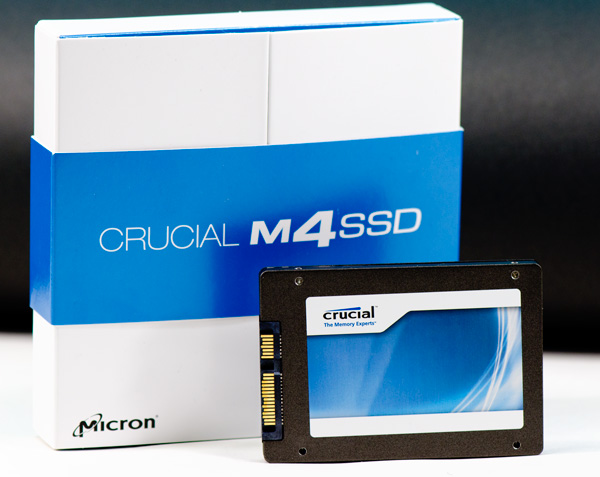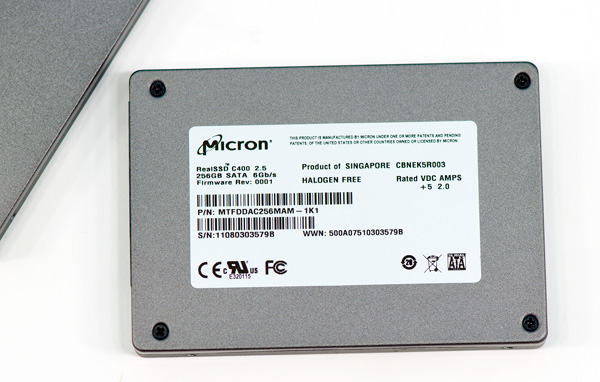The Crucial m4 (Micron C400) SSD Review
by Anand Lal Shimpi on March 31, 2011 3:16 AM ESTFinal Words
I'm not sure whether to call the m4 an evolutionary upgrade in performance or a shift in performance. Write speed is faster across the board, but read speed took a definite hit compared to the C300. Overall Crucial has a faster drive on its hands, one that's particularly well suited to most of our lighter workloads. It's only in our new 2011 heavy multitasking workload that the m4 really fell short. For your average desktop usage model, the m4 is either the best or second best you can get.
I am a bit put off by the fact that the m4 doesn't seem to have the peak sequential performance of some of the other next-generation drives we've reviewed. The Vertex 3 and Intel SSD 510 both do much better in sequential transfer speeds than the m4. To Crucial's credit however, without any data deduplication/compression it delivers the best 4KB random write performance we've seen to date.
My remaining concerns with the m4 are really not that different from those I had with the C300. Crucial's very late garbage collection allows the possibility for some very poor write speeds over time. If you're running in a configuration without TRIM support, I'd say this is enough to rule out the m4. Sure performance should recover with sequential write passes, however if your workload isn't sufficiently sequential then this could pose a problem. If you do have a TRIM enabled OS I'm not entirely sure how the m4 will behave over time. TRIM should keep things running smoothly but that will largely depend on workload. Again, I think that for most desktop/notebook users the m4 will do just fine but it's tough to say for sure without months of testing under my belt. In other words, like any other brand new SSD—approach with caution.
We should have the final Vertex 3 in house soon, but it's looking like all cards are on the table for this round. If SandForce/OCZ can manage to deliver a well tested, reliable product it may be difficult to recommend an alternative.












103 Comments
View All Comments
Chloiber - Thursday, March 31, 2011 - link
I'm a bit curious why I can't see any word on the last page on the strange sequential performance behaviour. AS SSD and in a way also PCMark Vantage show, that the m4 is very fast in sequential read. Why this huge difference? I'm not expecting an answer, but I expected a word on that on the last page. It it's very strange.iwod - Thursday, March 31, 2011 - link
Which means for majority of users, if you have Windows 7 , trim, m4 will properly be the best SSD to get.I wish they could bring down the price of their 60GB.......
ekerazha - Thursday, March 31, 2011 - link
The best is Vertex 3, my only concern is its power consumption.Kepe - Thursday, March 31, 2011 - link
SSD power consumption is very low compared to what CPUs and GPUs consume. I don't quite understand why an idle power consumption of 1,8 watts and load power consumption of ~4 watts would be such a big deal.The Vertex 3 probably consumes more power because the controller needs to do a bit more processing than other controllers do, with all those compression algorithms going on.
ekerazha - Thursday, March 31, 2011 - link
It is more power hungry than the Seagate HDD, on a desktop system it isn't a problem, but I'm concerned about using it on laptops.beginner99 - Thursday, March 31, 2011 - link
Yeah I always thought ssds use much less power but it doesn't really seem to be so.jcandle - Thursday, March 31, 2011 - link
Even in a performance notebook its a non-issue. I just wouldn't choose it for an ultraportable. But then I wouldn't been looking for best performance. Just a large SSD with best bang-for-the-buck would be the right balance. Having too much HDD speed when the system itself is holding you back doesn't help.taltamir - Thursday, March 31, 2011 - link
if you compare it to a 2.5" low RPM HDD, and only look at the watts/second then you might think so.but consider the power/work done also. Doing work takes time, it takes less time with the SSD, which makes it go idle sooner, which prolongs battery life.
that being said, 1.8 watt idle is rather high for a solid state device
Mr Perfect - Thursday, March 31, 2011 - link
That's a good point. Mechanical drives, especially the low power 2.5" ones, spend a lot of time thrashing around. SSDs, on the other hand, load your data in a snap and go right back to idle mode.It would make for an interesting battery test.
djgandy - Thursday, March 31, 2011 - link
The Seagate is a bit of a poor comparison as it is hybrid. The WD Raptor is the complete other extreme.A normal, run of the mill hard drive would be nice for comparison.